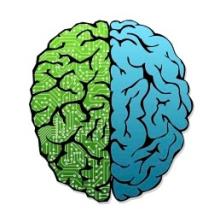
Advances in neurotechnology are aimed at helping us better understand normal brain function and how to treat dysfunction associated with brain disorders. These technological advances carry potentially profound ethical implications. A set of recently published articles highlight how the NIH BRAIN Initiative is working to integrate neuroethics in neurotechnology research and development.
Despite being a relatively new effort, research funded under the NIH BRAIN Initiative already is producing new technologies and methods
that push the envelope on our ability to record and modulate brain activity. These advances are exciting glimpses of the future of neuroscience and hold promise to deliver new ways to diagnose, treat, and even prevent brain disorders. At the same time, because the brain gives rise to our innermost thoughts, our most basic human needs, and consciousness, brain research raises important social and ethical questions that merit thoughtful consideration.
Two recent papers explore how the NIH BRAIN Initiative, and some of its international counterparts, are aiming to address the ethical issues associated with the research supported by these national brain projects. Hank Greely and Dr. Christine Grady, co-chairs of the NIH BRAIN Multi-Council Working Group Neuroethics Division (formerly Neuroethics Workgroup), along with Dr. Khara Ramos, Executive Secretary of the Division, published Neuroethics in the Age of Brain Projects as part of the Society for Neuroscience’s special issue of Neuron, focusing on the BRAIN Initiative’s and the European Union Human Brain Project’s neuroethics activities. The article details many of the ongoing efforts from the BRAIN Initiative, including the establishment of a Neuroethics Division within the NIH BRAIN Multi-Council Working Group that serves as a resource to help navigate ethical issues associated with BRAIN research. The Neuroethics Division works with NIH BRAIN Initiative leadership to provide input on ethical issues, consult on research projects as requested, and collaborate on workshops and whitepapers focused on particular neuroethics topics. Underscoring the emphasis on neuroethics within the BRAIN Initiative, NIH has recently released a Request for Applications associated with the BRAIN Initiative to support neuroethics research (applications are due January 30, 2017). This funding opportunity aims to address core ethical issues associated with research focused on the human brain and resulting from advances in neurotechnology supported by the BRAIN Initiative. Neuroethics in the Age of Brain Projects concludes that as neuroscience research efforts grow, so too must grow neuroethics.
The second article is a commentary piece in Cell by Drs. Sara Goering and Rafael Yuste, arguing for a set of ethical guidelines in the area of neurotechnology research, development, and application. The commentary focuses on how novel neurotechnologies “…will provide access to the core mechanisms that underlie human identity, memories, emotions, personality and, more generally, our minds.” Therefore, the authors argue for composing a framework to guide development and use of neurotechnologies in a way that is consistent with core societal and human values. They also point to the efforts of the NIH BRAIN Multi-Council Working Group Neuroethics Division and the broader neuroethics community to address these issues early on. Importantly, Goering and Yuste emphasize the value of integrating bioethicists with neuroscience researchers involved in the development of any new technologies. They highlight a recent meeting at Columbia University’s NeuroTechnology Center, supported by the Kavli Foundation, which brought together ethicists and neuroscientists to discuss how novel neurotechnologies affect concepts of identity, agency, and normality. A recent post at Theneuroethicsblog.com summarizes discussions from the meeting.
Taken together these articles highlight the need for neuroethicists and neuroscience researchers to critically evaluate the implications of new advances in neurotechnologies. Importantly, they also show how programs like the BRAIN Initiative are taking these implications seriously and are actively working with researchers to navigate them.
